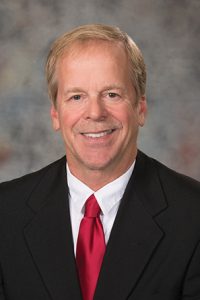Proposals to limit school district tax increases considered
The Revenue Committee heard testimony Jan. 20 on two bills that, with some exceptions, would cap annual increases in the amount of property taxes collected by public school districts.

Albion Sen. Tom Briese, sponsor of LB986 and LB987, said a cap on public schools’ taxing authority is “critical” if the Legislature is to direct more state funding to schools in an effort to reduce an overreliance on property taxes to fund public education.
Under LB986, a district’s property tax request — the amount of taxes requested to be raised through its levy — could not exceed its property tax request authority, which the state Department of Education would calculate each year.
A district’s property tax request would increase by the highest following percentage:
• the base growth percentage, equal to the percentage increase in the Consumer Price Index for all Urban Consumers, or 2.5 percent, whichever is greater;
• 40 percent of the annual percentage increase in the district’s student enrollment;
• 25 percent of the annual percentage increase in the district’s limited English proficiency students; or
• 25 percent of the annual percentage increase in the district’s poverty students.
The resulting amount then would decrease by an amount equal to the increase in a district’s non-property-tax revenue, which includes certain state sources. If revenue from those sources decreases, a district’s property tax request would increase by an equal amount.
Briese said this “floating cap” would ensure that any new state aid to public schools results in property tax relief. At the same time, he said, LB986 allows for “reasonable” tax asking increases for fast-growing districts.
LB986 also would allow a district to exceed its property tax request authority by an amount approved by 60 percent of legal voters. A 75 percent majority of a school board could exceed a district’s property tax request authority by 4 to 7 percent depending on the number of students they enroll.
The limit would not apply to the portion of a district’s property tax request needed to pay the principal and interest on approved bonds.
Under LB987, a district’s property tax request could not increase by more than 3 percent from the previous year or the percentage increase in inflation, whichever is greater.
Briese said the bill would allow a district to exceed its property tax request by a factor based on real property valuation growth. A district also could exceed the limit by an amount equal to a reduction in state aid resulting from a valuation increase.
Under certain conditions, a district also could exceed the limit by a majority vote of its board or by an amount approved by a majority of registered voters.
The limit would not apply to certain portions of a district’s property tax request, including amounts budgeted to pay for certain health and safety hazards or amounts pledged to retire approved bonds. It would apply to property tax requests set in 2023 through 2028.
Nicole Fox testified in support of both bills on behalf of the Platte Institute. She said Nebraskans generally do not want to cut public school funding but do want to keep property tax increases at a “reasonable level.”
“Requiring a vote of the people would give taxpayers an opportunity to say ‘no’ if the increases are inappropriate at that time or to approve an override if [school] boards have made a good case for that,” Fox said.
Bud Synhorst testified in support of both proposals on behalf of the Lincoln Independent Business Association. He said LIBA supports proposals that limit local taxing authorities to their previous year’s tax request multiplied by factors for inflation and real property growth.
“This allows room for the needed growth in our community and subdivisions without levying too heavy of a burden on the taxpayers,” Synhorst said.
Craig Beck testified in opposition to LB986 and LB987 on behalf of OpenSky Policy Institute. He said the cap in LB986 could interact with existing school levy and budget limitations in a way that prevents some schools from accessing their full property tax request authority.
Additionally, Beck said, requiring districts to reduce their property tax requests by the amount of non-property-tax revenue they receive could violate federal coronavirus relief funding requirements.
Jack Moles testified in opposition to both bills on behalf of the Nebraska Rural Community Schools Association, the Nebraska Council of School Administrators, the Nebraska State Education Association and other school organizations.
He said the measures would make it more difficult for schools to raise pay in an effort to address a shortage of teachers, paraprofessionals, maintenance workers and bus drivers.
Jason Buckingham also testified in opposition to both proposals on behalf of the Greater Nebraska Schools Association and Ralston Public Schools. In certain cases, he said, neither bill would allow a district to increase its property tax request enough to make up for a reduction in state equalization aid caused by large valuation increases.
The committee took no immediate action on either bill.

